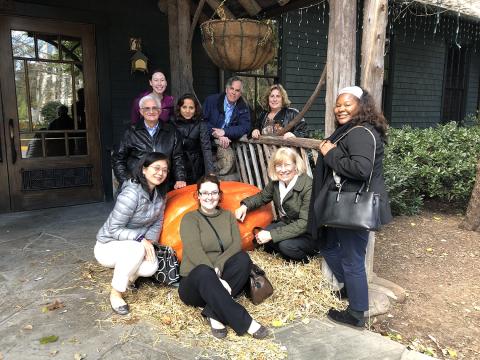NICHD's Henken Retires

After 35 years of federal service at NIH, Dr. Deborah Henken, program director and deputy branch chief at NIH’s Eunice Kennedy Shriver National Institute of Child Health and Human Development (NICHD), retired from full-time work on May 31.
“I have enjoyed my career at NIH—working to advance scientific progress in developmental neurobiology and assisting established and junior investigators to navigate the NIH system to achieve grant funding,” said Henken. “NICHD was an amazing place to work.”
Henken earned her undergraduate degree in psychology from Swarthmore College and her Ph.D. in neuroscience from Dalhousie University where she studied regeneration and plasticity in the teleost visual system. Upon completion of postdoctoral training in the department of anatomy at the Medical College of Pennsylvania (now Drexel University College of Medicine)—where she contributed to our understanding of neural regeneration in the mammalian peripheral nervous system—she moved to the intramural program. At NIH’s National Institute of Neurological Disorders and Stroke (NINDS), she focused on developing a viral method of peripheral nerve damage that would allow for neuronal regrowth in the central nervous system.
In 1995, Henken was accepted into the NIH Grants Associate (GA) Program and became the last scientist to complete the program before it was terminated; she was also the only person to be pregnant and give birth while in the program, perhaps presaging her ultimate home at NICHD.
The GA Program was officially introduced in 1962 and ran for 35 years.
“The GA Program was a unique, exciting and amazing way to learn about the NIH in particular, and the federal government in general,” she said. Her appreciation of the NIH as a special place stayed with her throughout her 35-year career.
Upon graduation from the GA program, Henken received offers from multiple institutes, and accepted a position as a program officer in the Developmental Biology, Genetics and Teratology Branch (now the Developmental Biology and Congenital Anomalies Branch) at the NICHD. While her background was in neuroscience rather than developmental biology, the former NICHD Director Dr. Duane Alexander and former NICHD Deputy Director Dr. Yvonne Maddox convinced her that NICHD was the right place to be to make a difference. Her 29-year career at NICHD attests to the fact that they were right.
Although Henken loved bench research, she found she loved public service more. As a program director, she managed a portfolio of research grants, training grants and programs focused on developmental neurobiology. She was instrumental in advocating for the zebrafish (and other non-human species) as important models for developmental biologists to understand the mechanisms underlying structural congenital anomalies, such as spina bifida. Especially supportive of the neural tube defect (NTD) research community, Henken was recognized by this group in 2024.

At NICHD, she chaired the Neuroscience Working Group and the K99/R00 Transition Committee and served as NICHD’s representative on the NIH Blueprint for Neuroscience Research since its inception.
Throughout her career, Henken contributed to NIH and the biomedical community through community service. As an NINDS fellow and junior woman in research, she co-founded the Bethesda Chapter of the Association for Women in Science (AWIS) and now has emeritus status.
As a young mother, she served as chair of the NIH Childcare Board. As her children grew, she became active in science education and continues to contribute to NIH Take Your Child to Work Day activities. She was chair of the NIH STEP (Staff Training in Extramural Programs), a wonderful trans-NIH extramural training group that focused on areas of science and science administration that fell between or crossed mission areas of NIH institutes and centers.
When her children were older, she focused on improving the workplace for federal employees by serving as co-chair of the NICHD WorkLife Enrichment (WE) Committee, secretary on the Recreation & Welfare (R&W) Board of Directors, and on the NIH Green Team. During her later, years she was an active member of the NIH Aging and Adult Dependent Care Committee (AADCC).
Throughout her career, Henken organized or co-developed workshops and conferences, chaired or served on many NICHD- and NIH-wide committees, and authored or co-authored a number of publications and journal articles. Over the years, her work garnered numerous recognitions and awards, and she was often invited to speak at national and international conferences, workshops and meetings. Her positive presence will be missed.
In retirement, Henken plans to travel and spend more time with family and with her greenery.
